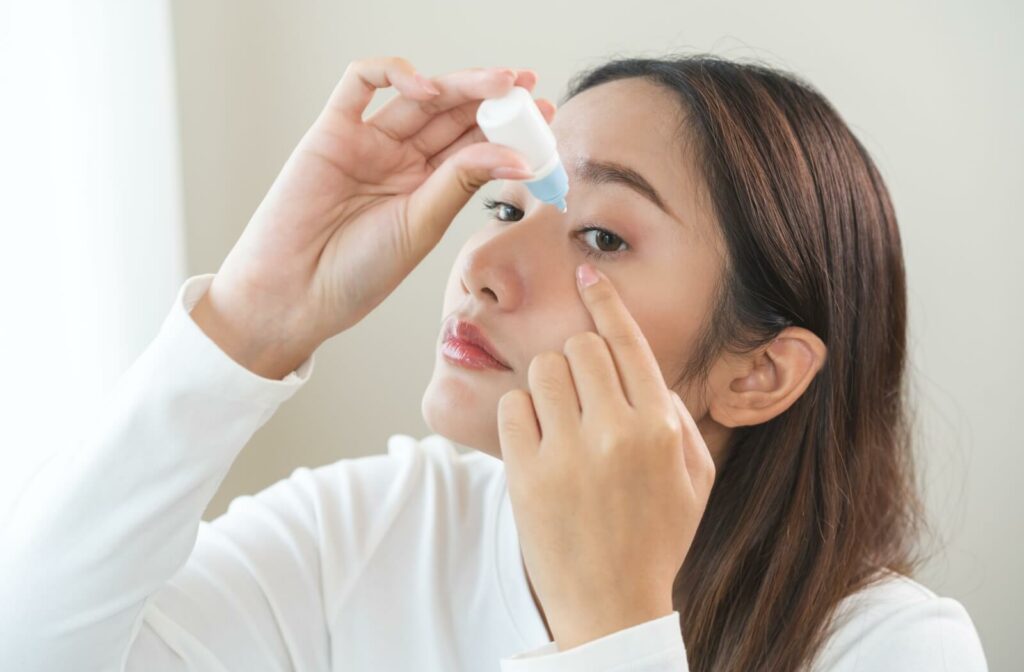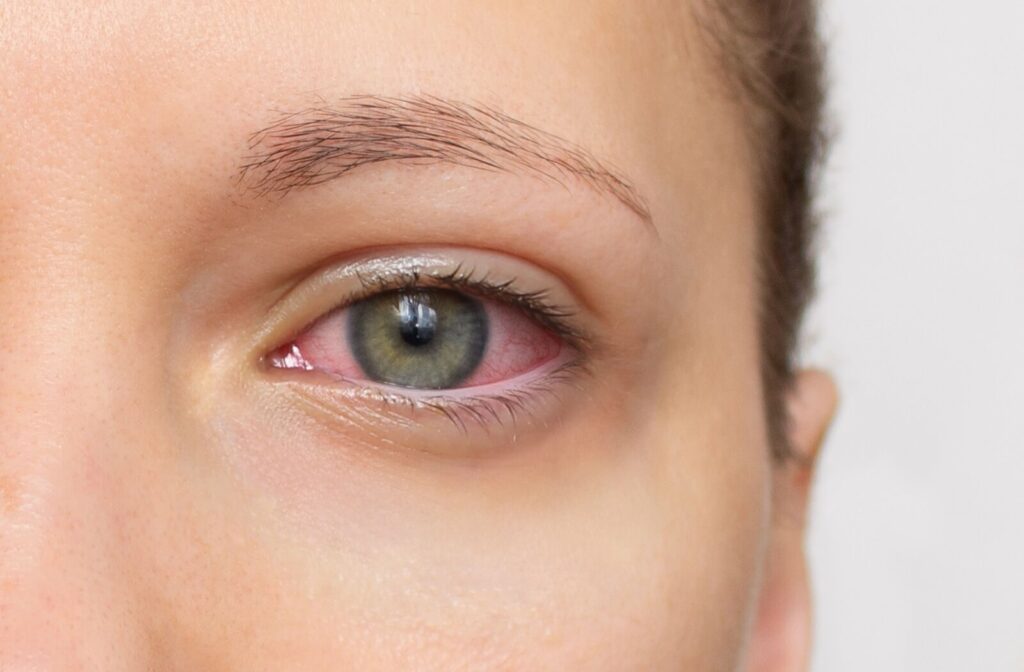Dry eye syndrome might sound like a minor nuisance, but it can potentially lead to more serious complications if left untreated. Dry eyes are prevalent, and while they typically manifest as irritation or discomfort, rare, untreated cases of dry eye can escalate to more serious complications like vision loss and blindness.
Fortunately, the symptoms of dry eyes can often be dealt with using over-the-counter and at-home remedies like lubricating eye drops or warm compresses. But persistent symptoms may require intervention from your eye doctor. So, the first step in seeking comfort should be to book an eye exam. Then, you can get expert advice and tailored dry eye treatments.
Understanding Dry Eye Syndrome
Dry eye syndrome, often called dry eye, occurs when your eyes fail to produce enough tears or when the tears evaporate too quickly, leaving you with inadequate tear coverage. It’s more than just an inconvenience—it’s a condition that can directly impact your quality of life, often causing discomfort and even making daily tasks like reading or driving challenging.
Tears also play a critical role in protecting the eye from infections, flushing out debris, and nourishing the cornea.
Symptoms & Causes of Dry Eye Syndrome
Dry eye can manifest differently depending on its severity, but common symptoms include:
- A stinging or burning sensation
- Redness and irritation
- Sensitivity to light
- Blurred vision or fluctuating clarity
- Feeling as though something is stuck in your eye
Several factors can cause these symptoms, including:
- Aging: Tear production often decreases as a natural part of aging
- Screen time: Reduced blinking while using computers or smartphones can worsen dry eye symptoms
- Environmental factors: Air pollution, wind, or dry climates can exacerbate existing dry eye symptoms
- Medical conditions: Certain autoimmune diseases and diabetes are a few conditions linked to an increased risk of dry eye
- Medications: Certain antihistamines, antidepressants, or diuretics can affect tear production—discuss alternative medications with your eye doctor
Can Untreated Dry Eye Cause Vision Loss or Blindness?
Here’s the critical question—can dry eye lead to blindness? While dry eye itself doesn’t directly cause blindness, severe, untreated cases can result in complications that impair vision, including leading to blindness or vision loss.
- Corneal damage: The cornea relies on tears for nourishment and protection. If not addressed, insufficient lubrication can cause corneal abrasions and ulcers, leading to permanent scarring or infection.
- Inflammation: Persistent dry eye inflammation may trigger damage to the surface of the eye, which can compromise your ability to see clearly.
- Vision fluctuations: Severe and untreated dry eye can interfere with the tear film, leading to unstable vision, especially when performing tasks like driving at night.
It’s important to note that complete blindness from dry eye is rare, but the condition’s progression without proper treatment can significantly affect your quality of life and visual clarity over time.
Tips for Managing & Preventing Dry Eye
Fortunately, there are steps you can take to alleviate symptoms of dry eye and protect your vision. Here are a few things to try for dry eye prevention or symptom management.

Use Artificial Tears
Over-the-counter lubricating eye drops can help replenish moisture on the eye’s surface. If those aren’t enough, talk to your doctor about prescription options.
Take Screen Breaks
Follow the 20-20-20 rule when using digital devices—every 20 minutes, look at something 20 feet away for at least 20 seconds. This helps provide a much-needed break for your eyes and helps prevent or alleviate eye strain.
Adjust Your Environment
Our environment can wreak havoc on our eye comfort. Use humidifiers in low-humidity spaces, avoid direct air conditioning or heating, and wear wraparound sunglasses outdoors to shield your eyes.
Optimize Your Diet
A healthy, balanced diet is essential for good overall health; eye health is no exception. Include omega-3 fatty acids found in fish oil or walnuts in your meals to improve tear quality naturally. Hydrate regularly with water to maintain overall eye health.
Consider Medical Interventions
Consult your eye doctor for persistent symptoms. Treatments like punctal plugs, thermal pulsation, or prescription anti-inflammatory medications are all common forms of dry eye treatment.
Stay Consistent with Eyelid Hygiene
Sometimes, the answer could be as simple as improving eyelid hygiene. Gently cleaning your eyelids with a warm compress or cleansing solution can help unblock oil glands and improve tear production.
Prioritize Eye Health Today
Your vision is one of your most valuable assets, and protecting it starts with proactive care. While dry eye syndrome might seem minor, its potential to impact your quality of life and vision is significant if not addressed.
Early detection and consistent management are vital to reducing the risk of complications. If you’ve been experiencing dry eye symptoms—even mild ones—don’t wait to seek help.Call our team at Verona Vision Care today and schedule an eye exam. Together, we can prioritize your eye health and keep your vision crystal clear for years.




